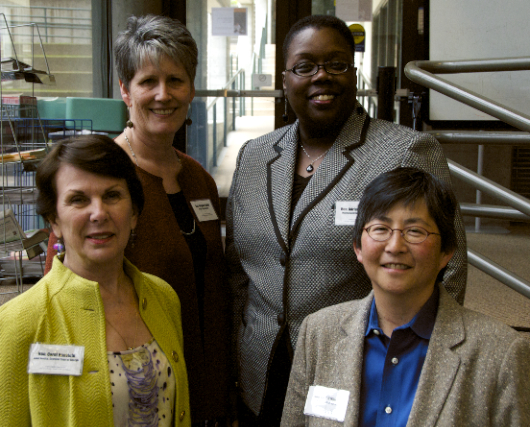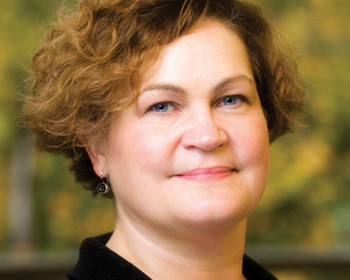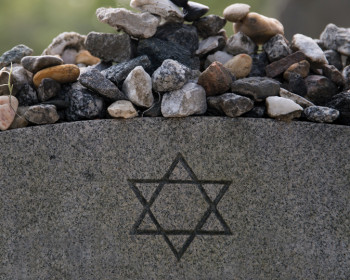Hon. Betty Roberts Women in the Law Program 2011
Open gallery

Written by Hon. Jill Tanner ‘88, Oregon Tax Court
Carol Hunstein, Chief Justice of the Georgia Supreme Court, was the keynote speaker for the third annual Hon. Betty Roberts Women in the Law program held March 28, 2011, at the Lewis & Clark Law School. Chief Justice Hunstein, who was a 1976 graduate of Stetson University College of Law, candidly admitted that “it wasn’t easy being among a handful of women law students in a sea of males,” wondering if she had the intellect and courage to graduate from law school. She most definitely had both. Chief Justice Hunstein rose to be the second woman in Georgia to serve on its highest court in a state that did not allow women to serve as jurors until 1953 because as one judge quipped “how could 12 women agree on anything!”
Chief Justice Hunstein’s remarks focused on her life story and how she and other “first women,” including Justice Betty Roberts ’66, who was Oregon’s first woman on the Supreme Court, made life decisions that made them singular role models because no other women had been there before them. After diagnosed at 18 months of age with polio and bone cancer at the age of four and again at 23, Chief Justice Hunstein ultimately suffered the loss of her leg below the knee. She grew up without a mother from the age of eleven. After graduating from high school with no financial support from her father to continue her education, Chief Justice Hunstein began the most difficult period of her life, thinking that “things couldn’t get any worse, but they did.” She married soon after high school, but within a few years, her husband left her, leaving her alone to care for herself and her son at the time she was coping with her amputation. As a single parent in her twenties facing the ordeal of learning to walk with an artificial leg, one of her rehabilitation specialists told her of an education program “for people like her” that would pay 100 percent of the tuition and books plus give her $25 per week. That was the opportunity Chief Justice Hunstein needed; first, she successfully earned an associate degree, and then, a bachelor of science degree, followed by a JD After law school, she entered private practice in Georgia.
Chief Justice Hunstein’s first judicial race was against four other men; after going door-to-door, she got the votes needed to be elected to the Superior Court of DeKalb County. Chief Justice Hunstein was the first woman to serve as President of the Council of Superior Court Judges. While holding that position in 1991, all seven Georgia Supreme Court justices recused themselves and designated seven superior court judges to hear and decide a pending case. Because she was President of the Council, Chief Justice Hunstein served by designation as Chief Justice, making her the first person ever to serve as Chief Justice without being a permanent member of the Georgia Supreme Court.
During her remarks, Chief Justice Hunstein discussed the status of women in leadership roles, citing various studies and observing that even though women make up 51 percent of the U.S. population women hold only 26 percent of the federal and state judgeships. After noting that everyone encounters obstacles and observing that those problems should not define us, but rather we should be remembered by how we use our strengths and gifts to respond, Chief Justice Hunstein joined other panel members: Virginia Linder, Oregon Supreme Court Justice; Lynn Nakamoto, Oregon Court of Appeals Judge; Adrienne Nelson, Multnomah County Circuit Court Judge; and moderator, Paula Abrams, Professor of Law, Lewis & Clark Law School, for a lively discussion of among other things whether the glass ceiling is still in place.
All panelists agreed that the glass ceiling still exists but that the barrier described as a subconscious barrier is hard to see and identify but exists because our culture has not completely changed. In coping with any type of barrier, Judge Nelson commented that we need to “trust what we know, speak when we can, and remember it is not always wise to speak out every time.” Justice Linder and Judge Nakamoto suggested using a question method to clarify and call attention to the perceived bias. Justice Linder stated that it is often easier to be “someone else’s champion.”
In response to the question asking about the impact of women attorneys on the legal landscape, Judge Nelson commented that women are better listeners, better able to read the jury, and Chief Justice Hunstein joined her in concluding that women are often better prepared, making them better litigators. Chief Justice Hunstein and Justice Linder stated that the explosion of sex abuse and sexual harassment cases in the 1980s are directly linked to the arrival of women in law enforcement, medicine and law.
In discussing whether women should create their own “old girls’ network” to match the “old boys’ network,” all panelists agreed that women supporting women benefits everyone and Justice Linder congratulated Oregon Women Lawyers for creating a network of influential women who mentor each other. Judge Nakamoto credited with appreciation Justice Betty Roberts’ network for helping her and many other women to get on the bench.
After a few more questions from the audience, Dean Robert Klonoff invited everyone to an informal reception where Chief Justice Hunstein and all panel members continued the conversation with new and old friends. The program was made possible through an endowment by Williams Love O’Leary & Powers, PC, Portland, Oregon.
Editor’s Note: The Advocate notes the sad passing of Hon. Betty Roberts, the namesake of the Hon. Betty Roberts Women in the Program. Please watch for a special tribute to Betty in the Fall issue of the Advocate magazine.
More Advocate Magazine Stories
email jasbury@lclark.edu
voice 503-768-6605
Judy Asbury, Assistant Dean, Communications and External Relations
Advocate Magazine
Lewis & Clark Law School
10101 S. Terwilliger Boulevard MSC 51
Portland OR 97219

